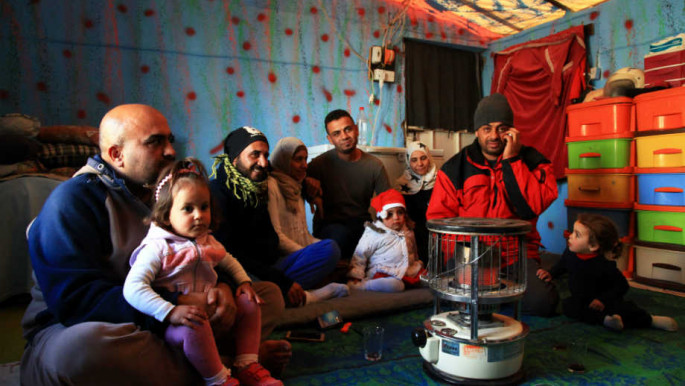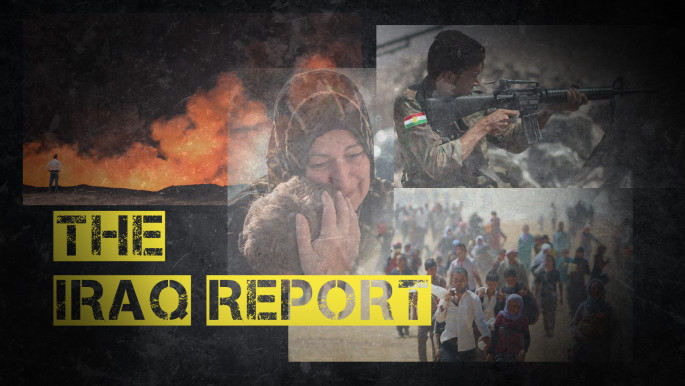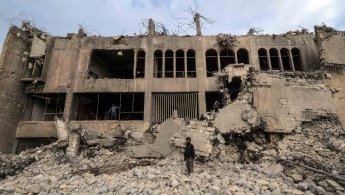The Iraq Report: Palestinian refugees want out as Iraq moves closer to Iran
Palestinian refugees in Iraq have suffered tremendously since the US- and UK-led invasion in 2003, and many of their already diminished numbers in the country are seeking refuge elsewhere.
Maligned as "Saddam's favourites" by Shia Islamist politicians and armed pro-Iran Shia militias, Palestinians have been subjected to abduction, torture, extortion and have had their identity documents stripped from them to "encourage" their departure.
Not only are Palestinian refugees seeking an escape, but Iraqis themselves are trying to leave, to find opportunities for themselves and their families elsewhere. The people of Mosul, for example, have accused officials of condoning or even participating in sabotage campaigns and pillaging of public and private property - using the mass destruction left in the wake of the battle against the Islamic State group as an excuse to justify the general lawlessness that has plagued the city since its recapture in 2017.
With Iraq edging ever closer to Iran and making it clear that Baghdad will not participate in any international action against their eastern neighbour, Iraqis feel Tehran has become a suzerain over Baghdad and see little to be hopeful for.
Twitter Post
|
Palestinian refugees complain of rights abuses
Considering the popularity of the Palestinian cause, it is somewhat surprising that the plight of Palestinian refugees in Iraq is so severely under-reported. After suffering more than a decade and a half of abuses, Palestinians who have been living in Iraq since the creation of Israel in 1948 are now seeking to leave their adoptive home to escape the torments they suffer on a daily basis.
Palestinians have effectively been stripped of their identity and travel documents by successive Iraqi governments, beginning with the administration of former Prime Minister Nouri al-Maliki, who only lost his grip on almost a decade of power to successor Haidar al-Abadi after the IS debacle and the rout of the Iraqi armed forces in 2014.
Having been maligned as being "Baathist loyalists", "Saddam's favourites" and simply "Sunnis", Palestinian refugees were heavily targeted by sectarian Shia militias in the wake of Saddam Hussein's regime. In 2003 alone, 344 Palestinian families were forcibly expelled from their homes by militias.
Between 2003 and 2016, an estimated 300 Palestinian refugees were killed by these militias, according to figures from the Palestinian diplomatic mission in Baghdad. The Iraqi authorities largely turned a blind eye, as Palestinians have been demonised even in social media posts as potential "terrorists" by accounts linked to the interior ministry.
One such post suggests that, between 2007 and 2013, Palestinians represented the largest proportion of suicide bombers who had detonated explosives in Iraqi cities.
Matters became significantly worse after the defeat of IS in December 2017. Weeks after the extremists had been declared defeated, then-President Fuad Masum was reported as having signed off on a law that determined all Palestinians were "foreigners" and that laws related to residency and visitation in Iraq previously passed by the Baathist regime would be declared null and void.
Effectively, this ended all legal rights for Palestinians, as the Saddam Hussein regime had previously declared all Palestinians to be treated equally to Iraqi citizens - with the exception that they would be allowed no right of political participation, no right to Iraqi nationality and would not be conscripted into the armed forces or other compulsory national service.
This stood in marked contrast to other Arab states such as Lebanon, which do not even allow Palestinians to own property, run businesses or gain employment.
In the past year, Palestinian residents and refugees have been forced out of their homes, their business interests threatened, and faced ongoing arbitrary arrests, torture and even targeted killings.
By refusing to renew their Baath-era identity papers, and by scrapping laws designed to protect their rights, the Iraqi government is effectively denying Palestinians any legal protection and applying considerable pressure on the remaining 4,000 to 6,000 Palestinians in Iraq to leave. In 2003, around 40,000 Palestinian refugees lived in Iraq.
 |
| Tens of thousands of Palestinian refugees have already sought to leave Iraq [Getty] |
Mosul 'pillaged' as security slides
Palestinians are not the only ones who are desperate to leave Iraq. Iraqis themselves are reportedly applying in large numbers to foreign language institutions so they can equip themselves with the skills necessary to work and survive outside their homeland.
Despite a record budget of $111.8 billion having been approved last week, representing close to a 45 percent increase in public spending, this has not dampened the desire of many Iraqis, particularly between the ages of 18 and 30, to seek opportunities abroad.
The reasons are myriad, and include Baghdad's economic mismanagement, an oversized public sector and bureaucracy, and rampant corruption that has drained public coffers for the better part of two decades.
Arguably, however, the main reason is a complete lack of security and the impunity of certain political and military groups, seen to be untouchable and above the law as they extort their fellow countrymen.
When Mosul was under the yoke of IS occupation between 2014 and 2017, the Abadi administration promised that, when the city was recaptured, it would fully return to the Iraqi fold and the sectarian abuses of the previous decade would end.
More than a year has passed since Mosul was recaptured by the Iraqi army, allied Kurdish and Shia militias, and the US-led anti-IS coalition. The city was left a wrecked husk of its former self as Iraq's second city, with entire districts bombed out; corpses of militants and civilians alike left rotting under the rubble.
Just last Friday, the Committee to Protect Journalists (CPJ) reported that several Iraqi journalists had been arrested after trying to report from Mosul's Old City, the most devastated part of the city, where the smell of death still lingers. These arrests followed the detention of a news crew who had attempted to film inside the Old City just days earlier - after the governor of Nineveh, Nawfal Hammadi al-Sultan, declared only vetted state television journalists would be allowed, in case other journalists sought to "portray a negative image [of Mosul]".
Among the stories the governor would like to avoid are allegations from residents that local officials and pro-Iran militia groups have been sabotaging and pillaging Mosul.
Twitter Post
|
Locals have complained of government-backed militants looting homes, shops and other private property, as well as public property. They have also complained of being arrested, subjected to torture, intimidation and extortion, describing their home districts as being more akin to "internment camps" than places to live.
Local officials have denied any involvement in these acts and have instead blamed central authorities for allowing numerous security and military agencies to operate in Mosul with no coordination or overall chain of command. This has allowed for residents to be detained "accidentally" by two or more agencies even after being cleared for release by a judge or senior field commander, often after paying exorbitant bribes.
These circumstances are almost a mirror of how Mosul was governed in the years leading to the IS blitzkrieg. Disillusioned by the central authorities, residents initially welcomed IS after the Iraqi security forces had discriminated against the city's people on a sectarian basis. Residents soon found themselves, however, in the grip of one of the most repressive armed militant groups in recent history.
Circumstances today may be even worse than they were before 2014, and it will not be long until those who feel their dignity is being abused and crushed will seek the means to fight back. This is an outcome that must be avoided at all costs to avoid a repeat of recent Iraqi history and to prevent IS from having a window through which to come back into Iraqi society.
Iraq rules out any hostile action towards Iran
This past week has shown an increased alignment of Iraqi foreign policy with Iran's, as a series of diplomatic announcements made it clear that US attempts to woo Baghdad away from Tehran's fold have failed dramatically.
On Sunday, British Middle East Minister Alistair Burt encouraged Iraq to "follow its own future in terms of foreign relations" and to make sure it "isn't reliant on Iran" by reducing its reliance on Iranian energy. Despite being one of the most energy-rich countries in the world, Iraq has been importing Iranian gas and electricity to shore up its chronically unstable and barely fit-for-purpose power grid that leaves Iraqis without electricity for most of the day.
The United States last year slapped sanctions on Iran and any country that deals with its energy sector, but has granted Iraq a waiver in order to give Baghdad time to diversify its energy suppliers and move away from Tehran. Nevertheless, Iraq is still importing the bulk of its energy from Iran.
Iraqi Foreign Minister Mohammed Ali al-Hakim indirectly responded to Burt's comments on Wednesday, saying his country would "not enter into any alliance or front against Iran".
In a press conference with his Russian counterpart, Sergei Lavrov, Hakim also stated Iraq supported the re-admission of Syria, a close Iranian and Russian ally, to the Arab League. Syria had been expelled due to President Bashar al-Assad's deadly crackdown on peaceful protests that led to hundreds of thousands killed and millions forced to leave their homes.
Just as it had with Haidar al-Abadi, Washington welcomed Prime Minister Adel Abdul Mahdi's appointment, believing his close links with his American backers who helped him to return to Iraq after the overthrow of Saddam would trump his religious and political loyalty to Tehran. However, and since his appointment, Iran's interests have steadily strengthened and not weakened as the Trump administration may have hoped.
The Iraq Report is a weekly feature at The New Arab.




